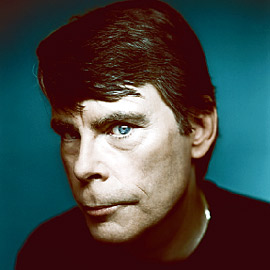King has had a successful career selling over 350 million copies of his works with many being transformed into movies or TV mini-series. He is the king of horror.

However, what impact does he have on faith? It seems to me that his greatest contribution is in asking questions. R.W. Bonn lifts up some of these from four of his novels (Don't Stop Believin', 104):
- "Jesus watches from the wall, but his face is cold as stone. And if he loves me - why do I feel so alone?" (Carrie, 1976)
- "I don't want Church to be like all those dead pets! I don't want Church to ever be dead. He's my cat! He's not God's cat! Let God have his own cat!" (Pet Cemetery, 1983)
- "Do you know how cruel your God can be, David? How fantastically cruel?...Sometimes he makes us live." (Desperation, 1996)
- "If it happens, God lets it happen, and when we say 'I don't understand,' God replies, 'I don't care.' " (The Green Mile, 1996)
Indeed these quotes and his overall focus on the macabre and mysterious leads one to believe that he has some form of belief system. In fact King was raised in the Methodist church, focusing a lot of his formative years of youth on doctrine. However, it seems as though such intensity burned King out. He currently admits to reading the Bible and believing in God, but has no interest in organized religion. He likes to look at questions more than anything else when it comes to faith. Bonn writes, "Is Stephen King a Christian? In portraying the religious teachings of his childhood and confronting a suspenseful, horror-filled world where God often seems absent and cruel and the behavior of his followers puzzling if not down right evil, what if Stephen King is asking the same of us?" (105) The answer seems to be yes.
King addresses the view of a doctrinal God he was given from the perspective of a young child, a scary God with sometimes worse followers, in most of his work. And with such an understanding of the divine, he forces us to answer for our beliefs. What God do you believe in? How do you follow God? What horrors have you released onto creation? As a Lutheran I am the first to admit that I am both a sinner and a saint, a flawed human being, but still called as a disciple and a child of God in baptism. It is living in the messiness of the world where I can let God's love shine forth in the darkness.
As I am writing this, a friend of mine just texted me voicing frustration over ministering to a difficult pastoral care situation. I will not go into details, but it is a hellish situation that no person should experience. However, as a pastor-to-be I know that God has called me by name, sends me into the shit of life, and equips me to be the divine peace, hope, and comfort in any given situation. News flash everyone...so are you. Discipleship calls us in all of our imperfections to minister to each other, even if that situation is as frightening as a Stephen King novel. Despite what life throws at you, despite the questions without clear cut answers if any at all, despite living in the gray not so black and white world, take consolation that we are a resurrection people who will overcome the scary, the horrific, and the macabre. We will not come out unscathed, we will be beaten and bruised. But we will come out...and that is worth living for.
Peace,
Tom
P.S. Here is a list of my favorites from Stephen King
- Dreamcatcher
- The Girl Who Loved Tom Gordon
- The Green Mile Series
- The Shining

